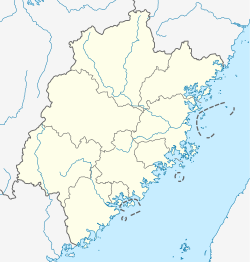Wuyishan (city)
|
Wuyishan 武夷山市 |
|
|---|---|
| County-level city | |
 |
|
 Location of Wuyishan City within Nanping City |
|
| Location in Fujian | |
| Coordinates: 27°46′N 118°02′E / 27.767°N 118.033°ECoordinates: 27°46′N 118°02′E / 27.767°N 118.033°E | |
| Country | People's Republic of China |
| Province | Fujian |
| Prefecture-level city | Nanping |
| Subdistrict | Chong'an Subdistrict |
| Government | |
| • CPC City Committee Secretary | Ma Bigang |
| Time zone | China Standard (UTC+8) |
| Website | www.wys.gov.cn |
Wuyishan City (Chinese: 武夷山市; pinyin: Wǔyíshān shì) is a county-level city in the municipal region of Nanping, in the northwest of Fujian province, People's Republic of China. It corresponds to the former Chong'an County.
A local subsection of the Wuyishan Mountain range, which forms the entirety of the geological and political divide between the provinces of Fujian and Jiangxi, is a front-rank national park called simply Wuyi Mountains. Since 1999 the park zone has been recognised by UNESCO as part of the world's natural and cultural heritage.
Cultural sites within the zone include the original cultivation ground of the Dahongpao tea variety, and a villa retreat used by Zhu Xi, a Confucian revivalist scholar-official of the rump or Southern Song Empire.
South of the zone, just short of the City's border with Jianyang District, is a major archaeological excavation of the vanished Yue (越) nation.
Not far from Wuyishan, the Jiyufang Laolong kiln (吉玉坊老龍窯), located in a village near the town of Shuiji, has been able to restart production of Jian ware using original clay.
The city executive, legislature and judiciary are in Chong'an Street Office (崇安街道), together with the CPC and PSB branches.
...
Wikipedia

